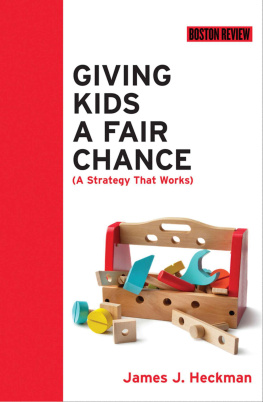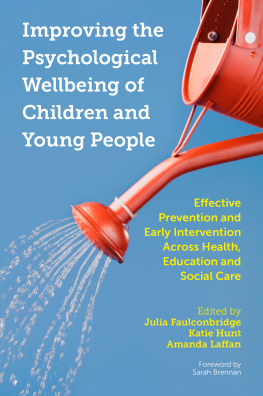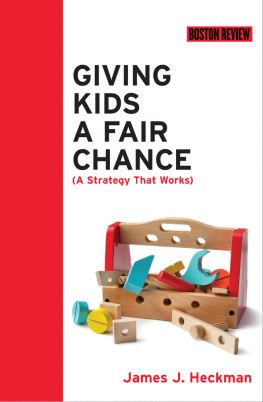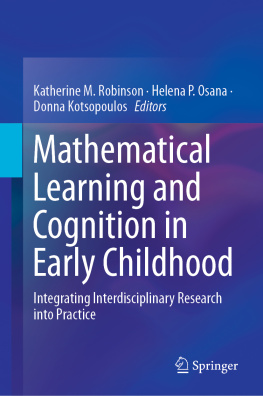Giving Kids a Fair Chance
Giving Kids a Fair Chance
James J. Heckman
A Boston Review Book
THE MIT PRESS Cambridge, Mass. London, England
2013 Massachusetts Institute of Technology
All rights reserved. No part of this book may be reproduced in any form by any electronic or mechanical means (including photocopying, recording, or information storage and retrieval) without permission in writing from the publisher.
This book, as well as the original Sept/Oct 2012 issue of Boston Review in which these essays appeared, was made possible by a generous grant from the Spencer Foundation.
Library of Congress Cataloging-in-Publication Data
Heckman, James J. (James Joseph)
Giving kids a fair chance / James J. Heckman.
p. cm. (Boston review books)
Includes bibliographical references and index.
ISBN 978-0-262-01913-2 (hardcover : alk. paper)
ISBN 978-0-262-31437-4 (retail e-book)
1. Children with social disabilitiesEducation (Early childhood)United States. 2. Educational equalizationUnited States. 3. United StatesSocial policy. I. Title.
LC4069.2H43 2013
372.210973dc23
2012048893
10 9 8 7 6 5 4 3 2 1
This book is dedicated to my wife Lynne Carol Pettler Heckman, who has been a constant source of support throughout my life.
Contents
I
Giving Kids a Fair Chance
James J. Heckman
The accident of birth is a principal source of inequality in America today. American society is dividing into skilled and unskilled, and the roots of this division lie in early childhood experiences. Kids born into disadvantaged environments are at much greater risk of being unskilled, having low lifetime earnings, and facing a range of personal and social troubles, including poor health, teen pregnancy, and crime. While we celebrate equality of opportunity, we live in a society in which birth is becoming fate.
This powerful impact of birth on life chances is bad for individuals born into disadvantage. And it is bad for American society. We are losing out on the potential contributions of large numbers of our citizens.
It does not have to be this way. With smart social policy, we can arrest the polarization between skilled and unskilled. But smart policy needs to be informed by the best available scientific evidence. It requires serious attention to the costs of alternative policies, as well as to their benefits. Close attention to the evidence suggests three large lessons for social policy.
First, life success depends on more than cognitive skills. Non-cognitive characteristicsincluding physical and mental health, as well as perseverance, attentiveness, motivation, self-confidence, and other socio-emotional qualitiesare also essential. While public attention tends to focus on cognitive skillsas measured by IQ tests, achievement tests, and tests administered by the Programme for International Student Assessment (PISA)non-cognitive characteristics also contribute to social success and in fact help to determine scores on the tests that we use to evaluate cognitive achievement.
Second, both cognitive and socio-emotional skills develop in early childhood, and their development depends on the family environment. But family environments in the United States have deteriorated over the past 40 years. A growing fraction of our children are being born into disadvantaged families, where disadvantage is most basically a matter of the quality of family life and only secondarily measured by the number of parents, their income, and their education levels. And that disadvantage tends to accumulate across generations.
Third, public policy focused on early interventions can improve these troubling results. Contrary to the views of genetic determinists, experimental evidence shows that intervening early can produce positive and lasting effects on children in disadvantaged families. This evidence is consistent with a large body of non-experimental evidence showing that the absence of supportive family environments harms childhood and adult outcomes. Early interventions can improve cognitive as well as socio-emotional skills. They promote schooling, reduce crime, foster workforce productivity, and reduce teenage pregnancy. And they have much greater economic and social impact than the later interventions that are the focus of conventional public policy debate: reducing pupil-teacher ratios; providing public job training, convict rehabilitation programs, adult literacy programs, and tuition subsidies; and spending on police. In fact, the benefits of later interventions are greatly enhanced by earlier interventions: skill begets skill; motivation begets motivation.
In short, to foster individual success, greater equality of opportunity, a more dynamic economy, and a healthier society, we need a major shift in social policy toward early intervention, with later interventions designed to reinforce those early efforts. (Although the Obama administration has funded more early childhood programs in its Race to the Top initiative, simultaneous cutbacks in state and local budgets have imperiled funding of preschool education throughout much of the nation.) And the interventions should address socio-emotional skills, not just cognitive abilities.
Polarization
In the first half of the twentieth century, each new cohort of Americans was more likely to graduate high school than the preceding one. This upward trend in secondary education increased worker productivity and fueled American economic growth.
Over the past 30 years, this long-term trend has reversed, and the decline is concentrated among males. Properly measured, the high school graduation rate in America has fallen. Over that same period, the real wages of high school graduates have increased relative to those of high school dropouts. These growing wage differentials have increased the economic incentive to graduate from high school. So the reversal in graduation rates is striking and troubling.
This trend is rarely noted in academic or policy discussions. In fact, the principal graduation rate issued by the National Center for Educational Statistics suggests that students responded to the increasing demand for skill by completing high school at higher rates and then attending and completing college in greater numbers. According to what many regard as the official high school graduation rate, U.S. schools now graduate nearly 88 percent of students, and black graduation rates have converged with those of non-Hispanic whites over the past four decades.
These numbers are badly misleading. The biggest problem is that they include General Education Development (GED) recipients as high school graduates. GEDs do not graduate from high school, but they certify as the equivalents of ordinary graduates by passing an exam. Currently 12 percent of all new high school credentials issued each year are to GEDs. But a substantial body of scholarship shows that GEDs earning power is similar to that of non-GED dropouts in the U.S. labor market. Including the GEDs in official graduation rates thus conceals major problems in American society. For example, a significant portion of the racial convergence in education reported in the official statistics is due to black males obtaining GED credentials in prison. But, when released, these men earn at the same rate as ex-convicts who did not earn GEDs. Moreover, the GED does not reduce recidivism.
What happens when we take the GEDs out of the graduating group and focus exclusively on native-born American children? The result is that the high school dropout rate has increased. In fact, the U.S. high school graduation rate peaked at around 80 percent in the early 1970s and has since declined by 45 percentage points. Roughly 65 percent of blacks and Hispanics now leave school without a high school diploma, substantially higher than the dropout rate for non-Hispanic whites. Contrary to claims based on the official statistics, there is no convergence in minority-majority graduation rates for males over the past 35 years. Moreover, exclusion of incarcerated populations from the official statistics substantially biases upward the reported high school graduation rate for black males.
Next page









